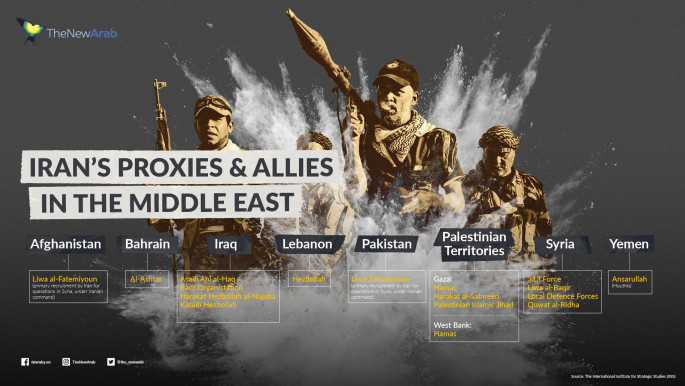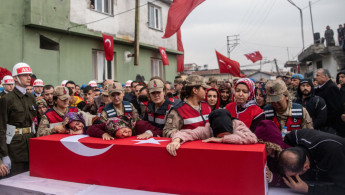Syria Weekly: Turkey retaliation blocks regime's advance in Idlib
Turkey has been a firm opponent of the Russian-backed Syrian regime offensive in northern Syria, which has seen around a million refugees head towards the Turkish border after opposition forces lost a series of towns and villages in Idlib and Aleppo.
As the regime onslaught continued through Idlib, it has also brought artillery fire and air strikes dangerously close to the 12 Turkish observation posts in the province.
Clashes
Twenty-one Turkish soldiers had been killed in Syrian regime airstrikes and shelling up to Wednesday, leading to widespread retaliatory strikes by Turkey.
On Wednesday, 33 Turkish soldiers lost their lives in Russian or Syrian regime bombing, prompting to Turkey to launch punitive drone strikes on regime positions across Idlib.
On Thursday, Turkey's Defence Minister Halusi Akar said the drone and artillery strikes had "neutralised" 309 soldiers, five helicopters, 23 tanks, 10 armoured vehicles, 23 howitzers, air defences and ammunition supplies.
Friday night saw more Turkish military intervention, with a Syrian general, Hezbollah militants and hardware hit.
|
|
Military blogger Oryx reported that the punitive campaign has led to "complete collapse of government forces" on frontlines in Idlib and Aleppo and given rebels hope of a fightback against the regime.
It has also pushed two former allies – Ankara and Moscow – closer to conflict than than at any point since 2015, when Turkish air defences downed a Russian fighter plane.
In a move that has been interpreted as an attempt to force NATO to support Turkey, President Recep Tayyip Erdogan said he was opening borders with Europe, the announcement seeing hundreds of refugees moving towards Greece.
If NATO refuses to back Ankara, then Erdogan will be in a difficult position.
He will have to weigh opposition from the Kemalist Republican People's Party against intervention and fears of direct conflict with Russia, with the need to halt the regime offensive in Idlib.
Stepping back could also impact on the president's image as a strong leader and see hostile Iranian militias on Turkey's southern border.
"It is unclear how things will go forward, but I think… that Turkey will be willing to act to protect its interests in the future," Noor Nahas, an open source researcher on the Syria War, told The New Arab.
"We also need to be watching the effect that the potential new wave of refugees will have on Europe and European policy towards Syria and Turkey. At the very least, Turkish and Russian relations have been harmed in a way that may be irreparable without significant work, which I don't see happening."
Intervention
Syrians are hoping that Turkish pressure will put the regime offensive on hold or see Ankara enforce a no-fly zone in northwest Syria, viewed as the only concrete way of halting the daily bombing of towns and villages in Idlib.
"I think that Turkey remains the best hope for rebels militarily, and for the people suffering under air strikes and displacement in Idlib caused by the regime and Russia," said Nahas.
"If Turkey is able to permanently stop strikes on Idlib by Russia and the regime, but as it stands no one else has been willing to act like Turkey has."
 |
Rebels reclaimed the town of Saraqeb this week after reports of a decrease in air strikes, highlighting just how reliant the ground offensive is on Russian air support and Iran-backed militias.
"Without the backing of Russia and Iran, rebels would have no problem stopping the regime assault on Idlib," said Nahas.
"The Syrian regime sees soldiers and conscripts as totally
disposable, with losses not affecting military decisions so long as the Russian air force and Iranian forces are able to back them up," Nahas said.
Erdogan will hope the retaliatory strikes will prove too costly for the regime to continue attacks on areas close to Turkish positions.
If not, the regime would likely continue to advance towards the Turkish border, which remains closed to refugees desperate to flee Iranian militias and Syrian forces.
"There would be the massacre of tens, if not hundreds, of thousands of people. Rebel groups have prepared to fight the regime for as long as they can," Nahas said, referring to the prospect of the regime taking the whole of Idlib.
"We can see the total failure of reconciliation with the regime that lead to an insurgency in Daraa where reconciled rebels, government officials, and civilians suffer under assassinations, regime disappearances, and total lack of security."
After a series of defeats in Idlib, Turkish intervention, or pressure on Russia, appears to be the only barrier to the regime's total domination of Idlib.
NATO support
Ömer Özkizilcik, an analyst at the Security Studies of the SETA Foundation in Ankara, is convinced that Erdogan will prevent the regime from capturing Idlib.
"Turkey won't back down from its goals in Idlib. Turkey will act in line with its responsibility to protect and prevent a new Bosnia or Rwanda," Özkizilcik told The New Arab.
Turkish forces have built up on the Syrian border, in anticipation of a 1 March deadline for regime forces to withdraw from areas recently captured from the opposition.
"Turkey will likely continue to strike the Assad regime and even may launch a ground assault to re-establish the Sochi [de-escalation agreement] line. Only a good Russian offer may hinder Turkey from doing so, but regardless of what will happen in the future, Turkish-Russian relations won't be the same anymore after the 27 February attack," Özkizilcik said.
Turkey's strong response to regime attacks has been surprisingly tough considering Ankara's close relationship with Russia, which has strengthened as Erdogan's fraught relationships with NATO allies began to crumble.
The potential for the crisis to rebuild alliances in NATO and protect civilians will have long-term implications on the future of the military union.
"NATO, the US and Europe have a golden opportunity, but whether they use this, or not, is in their court. However, the Turks will remember these days for a long period, those who have been engaged in aggression and those who have watched from the side lines," Özkizilcik said.
Özkizilcik said that a wider military campaign against the regime in Idlib would be backed by most Turks apart from some "Russia advocates" and "Baathists".
"The Turkish people are different than the Europeans, any attack on Turkish soldiers unites the ranks. All political parties including those who criticised Turkey's Syrian policy are behind the Turkish government."
Syria Weekly is a regular feature from The New Arab. To get Syria Weekly in your inbox each week, sign up here
Paul McLoughlin is a news editor at The New Arab.
Follow him on Twitter: @PaullMcLoughlin



